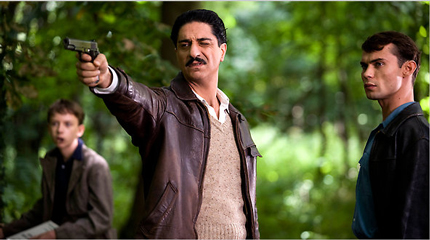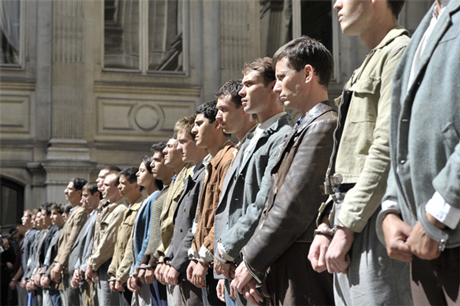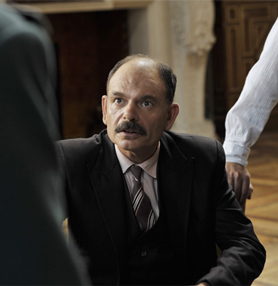
 |
|
|
|
The production resources required to mount WW2 movies about the German Occupation of France have made stories of the resistance and underground less frequent film fare. But those that do get made tend to be well researched and realistic. Jean-Pierre Melville's 1970 Army of Shadows is a superior example. Other distinguished entries are fascinating 'sidebar' tales of factual intrigue and tragedy, such as Francois Truffaut' s 1981 The Last Metro, Claude Chabrol's heart-rending Story of Women and Christian de Chalonge's little-seen Dr. Petiot (1990), which plays almost like a horror film. Wartime American movies about the Occupation tended toward patriotic simplifications. After the war, when the Iron Curtain menace supplanted Nazis as the prime threat to peace, Cold War filmmakers adjusted by making war movies into moralizing escapism. Every intrepid resistance unit was required to staff a sexy French star, the better to fall in love with the American or British hero. Few critics appreciated René Clément's Is Paris Burning?, but that epic acknowledged the complicated nature of the resistance, which was not one but dozens of separate movements, often pitted against one another. 
French-Armenian director Robert Guédiguian states that his 2009 film Army of Crime (L'armée du crime) is a highly personal project with a specific aim -- to show that many of the most active resistance fighters were foreign refugees from parts of Europe already under Nazi rule. As explained in Erich Maria Remarque's novel Flotsam (filmed in 1941 as So Ends Our Night), many stateless Jews and political refugees of the late 1930s fled to the safe haven of Paris to avoid German persecution. With the unexpected fall of France in 1940, some of these refugees were the first to fight back. This resistance movement wasn't really a manifestation of French patriotism, but a concerted effort led by anti-Fascist Communists, Jews, and stateless persons. Few others were willing to die opposing the German occupiers. The irony is that as soon as France was liberated, these leftist elements were effectively shut out of the country's political future. Made at a time when so many countries with economic problems are experiencing a heavy anti-immigrant backlash, Guédiguian's film also carries a strong message for contemporary audiences. Outsiders of several nationalities living in occupied France become resistance fighters, for idealistic reasons as well as simple revenge. The voiding of the Hitler-Stalin pact results in a crackdown on Parisian Communists. Soon thereafter begins the mass roundup of French and foreign Jews. Young Polish Jew Marcel Rayman (Robinson Stévinin) learns that his family has been targeted but can't convince his father to not register with the authorities. Frustrated, Marcel gets a gun and begins assassinating German officers and soldiers on the street. The same goes for Communist student Thomas Elek (Grégoire Leprince-Ringuet), who uses his physics background to make bombs. These wild-card killers are eventually brought into line by organizers from Moscow. Taking leadership of this resistance group is Missak Manouchian (Simon Abkarian), an Armenian poet whose family was wiped out by the Turks twenty years before. Some of his recruits are difficult to manage, in particular Marcel, who continues to win swimming contests under the name Michel Rougemont. But the Manouchian organization successfully coordinates work by Hungarians, Armenians, anti-Mussolini Italians and anti-Franco Spaniards. The command demands that fighter Olga Bancic (Olga Legrand), who has already left her baby daughter in care elsewhere, leave her husband so as not to attract attention. For his part, Missak Manouchian refuses to part with his loving wife Mélinée (Virginie Ledoyen). The German overlords are pleased when the collaborating Paris police show initiative in hunting down the Communist terrorists. The gendarmes state that they are not traitors working for the Germans, but patriots united against Bolshevism. Thousands of Jews are rounded up for deportation to 'work camps', without the Germans committing a single soldier to make it happen. Several torture centers are established right in the middle of the city. The efficient local inspector René Pujol (Jean-Pierre Darroussin) is invited to join a special anti-terrorist squad and is soon capturing suspects for torture. Pujol befriends Marcel's girlfriend Monique (Lola Maymark) after the rest of her family has been deported. She thinks she's found a protector, but Pujol wants to use her to entrap the entire Manouchian cell. The complex, exciting Army of Crime builds considerable suspense. Cast with interesting character faces and successfully managing its period atmosphere, the film is free of action-film hype and heavy on character. We see the commitment on the faces of these young people as they split up their families, sneak arms around the city and become murderous assassins. These aren't fanatics, not even the young men who begin killing on their own. They simply don't buy into the mass denial that their deported relatives will someday return, and they have no intention of going quietly. The irony is that these foreigners and 'losers' are defending French democratic values, while the ordinary citizens quietly collaborate in mass murder. The title of the movie comes from a famous "red poster" circulated throughout Paris by the Vichy regime, branding the Manouchians as foreign criminals and terrorist scum. They weren't even considered part of the official resistance. 
Much of the drama is refreshingly unfamiliar -- our underdogs make no sentimental speeches about inalienable human rights. Thomas Elek's mother expresses her approval of her son's activities, happy that he's killing under supervision rather than fighting on his own. In the basement of a downtown building, the French police run a torture 'clinic' on the principles of an assembly line -- passersby can occasionally hear screaming coming from within. Although the actual tortures aren't dwelled upon, we see induced drowning and a more graphic representation of the blowtorch treatment viewed briefly in Rossellini's Rome, Open City. The wily inspector Pujol at first seems a possible friend of the insurgents, like the sympathetic gendarme who gives Mrs. Manouchian information about her husband. Poor deluded Monique falls easily into Pujol's trap. She openly displays the furs and expensive jewelry he's given her, never realizing how callously she's being used. Interestingly, the reprehensible Pujol is the film's "James Bond" character -- he succeeds in his secret mission by sleeping with the lover of his enemy. Some historians (and not right-wingers) question how much all this carnage and sacrifice really accomplished. Nazi official Albert Speer testified that no resistance effort anywhere had a significant effect on Germany's war effort. Viewers have been conditioned to embrace the victory-in-defeat sentiment expressed by Dalton Trumbo in Spartacus, that "just by fighting back we accomplished something". After thrilling us with the adventures of his Soldier of Orange, Paul Verhoeven stated that the young Dutch resistance martyrs might have done more for their country just by lying low and surviving to help when the war was over. But existential dilemmas mean nothing to young people faced with extinction, who have nothing to lose from fighting back as best they can. And we still cling to the notion that throwing bombs and murdering individuals can be "noble revenge" -- as long as society gives its blessing to the choice of targets. Not that I'm questioning the film's veracity, but one scene seems rather self-serving, when the Manouchians abort a terror bombing for sentimental reasons. Even the most ruthless of the killers can't bring himself to toss a grenade into a nightclub filled with teenaged French girls as well as Germans. A movie like The Battle of Algiers doesn't shy away from the consequences of political violence -- it shows us the face of a tot eating ice cream before a female Algerian patriot blows him to bits. Army of Crime instead proceeds to an 'amusing' moment when the would-be bombers must scramble to find the pin to put back into their grenade. The Manouchians are never shown carrying out any actions so reprehensible as to alienate a film audience. Bolstered by excellent acting from an interesting ensemble cast, Army of Crime is a welcome addition to non-exploitative films about political resistance. It makes good points about the place of immigrants and outsiders in society, and about the compromised nature of all 'patriotic' violence. 
Lorber Films' DVD of Army of Crime is a fine transfer of this handsome and expensive-looking production. We know we're seeing the work of a thinking director in the very first scene, which views street life from the point of view of a prisoner in a police wagon - "beautiful" Paris looks different en route to one's execution. The track in English-subtitled French and German is presented in 5.1 surround sound. The title is also available in Blu-ray. Lorber adds two welcome interviews, both also subtitled. Director Robert Guédiguian talks about his Armenian background and the personal nature of the film's subject matter. Corralled for a chat at a film festival, stars Simon Abkarian and Virginie Ledoyen explain their interest in the script and the true history behind it. A drawback that comes with advertising great movies with a wartime theme is that DVD companies have little choice but to use the same imagery abused by cheapjack filmmakers. In this case, the main poster features the silhouette of a gun pointed at the head of an SS officer, as might an exploitative faux-documentary. The lead review quote tries to relate the movie to the exploitation fantasy Inglorious Basterds. Army of Crime is a superior, highly entertaining historical thriller.
On a scale of Excellent, Good, Fair, and Poor,
Army of Crime rates:
Reviews on the Savant main site have additional credits information and are often updated and annotated with reader input and graphics. Also, don't forget the 2010 Savant Wish List. T'was Ever Thus.
Review Staff | About DVD Talk | Newsletter Subscribe | Join DVD Talk Forum |
| ||||||||||||||||||